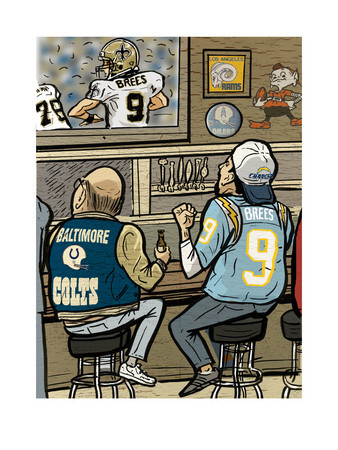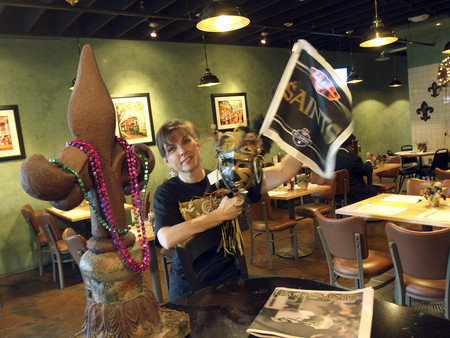Teams may depart, athletes may disappoint, but the crowds still show up on game day
If things were different, Paul Hill would be excited about today's Super Bowl, which pits the New Orleans Saints against the Indianapolis Colts.
Hill grew up in Las Vegas, but because the city doesn't have an NFL team, he became, as he puts it, "a big fan" of the Colts when he was about 8.
Problem is, Hill, now 52, adopted the Baltimore Colts as his team. When the Colts fled Baltimore for Indianapolis in 1984, they stopped being his team.
"I let them go," Hill says. "I just thought it was a raw deal, the way they just packed up and left (Baltimore) hanging. I didn't like that at all."
As highly paid players take the field today for the biggest single event on the American sporting calendar, consider, for a moment, the fans.
Fans who, thanks to free agency, must regularly acclimate themselves to such oddities as watching quarterback Drew Brees play today's game in a Saints, rather than a San Diego Chargers, jersey.
Fans whose loyalty is tested every time an athletic idol cheats (hello, Mark McGwire), falls victim to creepy personal indiscretions (hello, Tiger Woods) or just turns out to be dumber than we could have imagined (hello, Gilbert Arenas).
And, even, fans who can do nothing more than grit their teeth whenever they hear their team's nickname appended to a foreign locale (see: Colts, Lakers, Jazz, Dodgers, Cardinals, Rams, et. al.)
It's an immutable reality of sports fans' existence that the teams and athletes they pledge loyalty to will, at some point, find a way to let them down. Yet, like jilted lovers who haven't quite gotten the hint, they continue being fans.
Why do they persist? In large part because being a jersey-wearing, memorabilia-collecting, ticket-buying, face-painting homer is a means of connection in a disconnected world.
Fans identify with a team "because they are an extension of us," explains Kurt Stahura, a sport sociologist and associate professor at the University of Nevada, Las Vegas. "They're an extension of our city or our town or our state. We identify with them. They represent us on some level."
Note, Stahura says, the use of the pronoun "we" among fans, as in "we won" or "we kicked their butts."
Fandom also gives license to share in a communal event with like-minded people. In the case of the Super Bowl, sports attracts an even wider audience as a social event, Stahura notes.
It's tempting to think that such modern-day sports-page staples as franchise moves, steroid use and athletes' bad behavior make it harder than ever to be a fan. But try telling that to Dodgers fans who are still miffed that their team ever left Brooklyn or veteran fans who knew even back then that Mickey Mantle hoisted more drinks than most ever knew.
Still, there is a case to be made that the athletes and teams fans follow today are less connected to them than they used to be, and that the fan-team bond is the worse for it. For example, only a few decades ago, it wasn't uncommon for NFL players to live and work during the off-season in the cities where they played, Stahura says.
"They were recognized as an extension of the community, not as mercenaries as they've become today," he says. As a result, "I think people identified with them more."
Such direct bonds between fans and athletes still exist on the scholastic level, where "the kids that are playing are representing the community and that way of life," Stahura says. "They are symbolic of your class -- the east side of town and the west side of town, people on the hill versus those on the other side of the tracks.
"I think that when you look at high school events and college events, a Friday night football game or a Saturday afternoon football game, whether schools realize it or not, is a sort of umbilical cord that attaches us to places that we identify with."
But, on the pro level, bonding can be difficult. After his Colts left Baltimore, "I kind of gave up football," Hill says. It wasn't until about five years ago that friend Jeffrey Manz drew him back into the pigskin fold via the Pittsburgh Steelers.
Manz -- nickname: "Dawg" -- is co-owner with Hill of Aces and Eights Bar & Grill, a Steelers bar at 310 S. Decatur Blvd. Manz grew up a few miles from Three Rivers Stadium and says he has been a Steelers fan "for life, pretty much."
For Manz, 51, being a Steelers fan today isn't much different than it was when he was a kid. In fact, it's even more important now because Steelers fandom provides a link to his family and friends in Pittsburgh.
Manz knows that, whenever the Steelers play at home, his family will head to the stadium after church. "So, wherever I am, when I turn on the game I know my family's at the game, and the phone calls come," he says.
What would it take for him to stop being a Steelers fan? "I don't think it's possible for me to be turned off as a Steelers fan or as a (NHL) Penguins fan," he answers. "I will bleed black and gold no matter what."
Rick Santora, owner of Santora's Sunset Bar & Grill, a Buffalo Bills bar at 4401 E. Sunset Road, Henderson, moved to Las Vegas 30 years ago from Buffalo, N.Y., and still sees the same thing among sports fans who frequent the tavern.
During baseball's steroid scandals, for instance, Santora says he "talked to people who (say), 'OK, enough of that.' " But, for most fans, he continues, the response is that using steroids is "probably not right, but you're not going to stop going to games because of it."
"I think as you grow older and become, hopefully, wiser, you just accept the world as it is," Manz says.
But how about young fans, whose parents face the prospect of talking with children about such uncomfortable issues as domestic violence or drug use in the context of sports?
Hill says the closest he has come to dealing with that is talking with his 12-year-old daughter about Tiger Woods' extramarital activities. She is "kind of sad" about it, Hill says, "but it blows your mind how mature a 12-year-old is.
"Unfortunately, it's a reality of life that everybody is not perfect and everybody has their flaws. But she's like me. She wants to get past it and hurry up and get back in the game."
Actually, Hill suspects that kids may take negative occurrences in sports with more equanimity than adult fans do. Kids, he says, "just look at what they do (on the field) and how they play. The world outside of sports, I really don't think that they are involved in it."
But through it all, from scandals to losing seasons to stratospheric ticket prices, the fans persist. Santora says, for instance, that Bills fans -- who haven't had much to be happy about lately -- "come in here and bitch and complain. But they still come."
But, sometimes, fans are rewarded.
Lola Pokorny, owner of Lola's, A Louisiana Kitchen, 241 W. Charleston Blvd., was born in New Orleans and says she has been a New Orleans Saints fan "since Day One."
Two weeks ago, the Saints beat the Minnesota Vikings to earn a berth in today's game, marking the Saints' first Super Bowl appearance. And, Pokorny admits, "I have never cried about a game as much in my life."
Since Hurricane Katrina ravaged New Orleans in 2005, the Saints have been one of the threads that have kept the city joined together. And, ever since Katrina, Pokorny says, "I think the Saints knew they had the fans' backing. They have the whole Who Dat Nation, and it's not just in New Orleans.
"The Who Dat Nation is all over the country because so many people had to disperse after Katrina. The fan base (for the Saints) has moved throughout the nation. So they really have become America's team."
So, Pokorny says, today will be about "a lot more than winning a football game."
Contact reporter John Przybys at jprzybys@ reviewjournal.com or 702-383-0280.


















